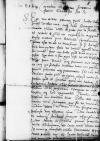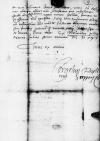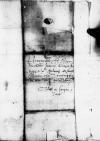Ego vero ad te ex The Astures an ancient Hispano-Celtic tribe, inhabitants of the NW of the Iberian Peninsula⌊AsturumThe Astures an ancient Hispano-Celtic tribe, inhabitants of the NW of the Iberian Peninsula⌋[1] portu Laredo (Laretum), town and harbor in northern Spain, Cantabria, 150 km W of Bilbao⌊LoredoLaredo (Laretum), town and harbor in northern Spain, Cantabria, 150 km W of Bilbao⌋ transscripsi de rebus meis easque cf. Cornelis DE SCHEPPER to Ioannes DANTISCUS Laredo, before 1525-07-06, CIDTC IDL 6540, letter lost⌊litterascf. Cornelis DE SCHEPPER to Ioannes DANTISCUS Laredo, before 1525-07-06, CIDTC IDL 6540, letter lost⌋ Hieronymus Viromandus secretary to Richard Wingfield, English ambassador in Spain, after 22, July 1525 secretary to Georg of Austria, Bishop of Bressanone-Brixen (CE, Vol. 3, 399-400)⌊Hieronymo ViromandoHieronymus Viromandus secretary to Richard Wingfield, English ambassador in Spain, after 22, July 1525 secretary to Georg of Austria, Bishop of Bressanone-Brixen (CE, Vol. 3, 399-400)⌋ iuveni docto et probo, qui a secretis est nobilis et generosi domini Richard Wingfield (Wimphildus) (*ca. 1469 – †1525), diplomat in the Habsburgs' service; in 1525 English special ambassador to the court of Charles V in Spain (CE, Vol. 3, 452; BELL, p. 45)⌊WynckfyldtRichard Wingfield (Wimphildus) (*ca. 1469 – †1525), diplomat in the Habsburgs' service; in 1525 English special ambassador to the court of Charles V in Spain (CE, Vol. 3, 452; BELL, p. 45)⌋ Henry VIII Tudor (*1491 – †1547), 1509-1547 King of England; son of Henry VII Tudor and Elizabeth of York⌊regiae maiestatis AngliaeHenry VIII Tudor (*1491 – †1547), 1509-1547 King of England; son of Henry VII Tudor and Elizabeth of York⌋ oratoris, puto Bilbao, city in northern Spain, Basque Country⌊Bilibaldi CantabrorumBilbao, city in northern Spain, Basque Country⌋ datas esse, ut ad te transferret. Hieronymus Viromandus secretary to Richard Wingfield, English ambassador in Spain, after 22, July 1525 secretary to Georg of Austria, Bishop of Bressanone-Brixen (CE, Vol. 3, 399-400)⌊IsHieronymus Viromandus secretary to Richard Wingfield, English ambassador in Spain, after 22, July 1525 secretary to Georg of Austria, Bishop of Bressanone-Brixen (CE, Vol. 3, 399-400)⌋ si hoc ipsum fecit, bene quidem fecit, uti hominem ingenuum decet, sin minus, sane non habes, quod de me conqueri possis. Ego enim is sum, quem nosti tui nominis te ipso studiosior praeco orig. preco⌈praecopraeco orig. preco⌉, tametsi neque praeconio orig. preconio⌈praeconiopraeconio orig. preconio⌉ meo indigeas, atque ego fortassis virtutem tuam non possim perinde praedicare orig. predicare⌈praedicarepraedicare orig. predicare⌉ atque promereatur. Sed nolo tecum adulari, partim quod eo ingenio numquam natus fui, partim quod tu Cornelium amicum non haberes, si adulatorem haberes.
De fortunis meis non est, quod multum ad te perscribam. Navigavi, uti nosti, Neptune (Neptunus), god of the sea in Roman mythology, identified with the Greek Poseidon⌊NeptunoNeptune (Neptunus), god of the sea in Roman mythology, identified with the Greek Poseidon⌋ atque Aeolus a minor deity in Greek mythology, custodian/king of the winds, which he released at the command of the higher gods⌊EoloAeolus a minor deity in Greek mythology, custodian/king of the winds, which he released at the command of the higher gods⌋ repugnantibus. Cornelius autem Neptune (Neptunus), god of the sea in Roman mythology, identified with the Greek Poseidon⌊NeptunumNeptune (Neptunus), god of the sea in Roman mythology, identified with the Greek Poseidon⌋ non admodum timet, Aeolus a minor deity in Greek mythology, custodian/king of the winds, which he released at the command of the higher gods⌊EolumAeolus a minor deity in Greek mythology, custodian/king of the winds, which he released at the command of the higher gods⌋ autem, inferiorum virium satrapam, qui fit, ut vereri admodum debeat orig. daebeat⌈debeatdebeat orig. daebeat⌉? Vis, dicam? cf. Verg. A. 4.701-702 ⌊Ter frustra comprehensa deos effugerat aura, par levibus ventis volucrique simillima somnocf. Verg. A. 4.701-702 ⌋, ut Virgil (Publius Vergilius Maro) (*70 BC – †19 BC), ancient Roman poet of the Augustan period, author of the Aeneid and many other works⌊MaroVirgil (Publius Vergilius Maro) (*70 BC – †19 BC), ancient Roman poet of the Augustan period, author of the Aeneid and many other works⌋ tuus ait. Veni tamen in Cornwall (Cornubia), duchy at the tip of the SW peninsula of Great Britain⌊CornubiamCornwall (Cornubia), duchy at the tip of the SW peninsula of Great Britain⌋, primum Fowey (Fowydh), town and seaport in SW England, Cornwall⌊FowicumFowey (Fowydh), town and seaport in SW England, Cornwall⌋, deinde Plymouth (Pleumodia), city and seaport in SW England, Devon⌊PleumodiamPlymouth (Pleumodia), city and seaport in SW England, Devon⌋, ubi leniit mihi dolorem nauseae marinae conversatio mutua honorabilis et praestantis orig. prestantis⌈praestantispraestantis orig. prestantis⌉ profecto viri domini James Horswell (*ca. 1496 – †1544-1546), 1528-1529, 1535-1536, 1542-1543 Mayor of Plymouth; from 1529 town clerk; by 1529 judge and admiralty judge (House of Commons, p. 395-396)⌊Iacobi Horswoll in the sender hand, written over i(?)⌈i(?)ll in the sender hand, written over i(?)⌉iJames Horswell (*ca. 1496 – †1544-1546), 1528-1529, 1535-1536, 1542-1543 Mayor of Plymouth; from 1529 town clerk; by 1529 judge and admiralty judge (House of Commons, p. 395-396)⌋, hominis, quem tibi praedicare orig. predicare⌈praedicarepraedicare orig. predicare⌉ nolo, quandoquidem illum  AAWO, AB, D. 3, f. 8v longe melius me dignoscere potuisti. Id dico atque iterum dico, quoniam iuratus tibi sum singula quaeque rerum mearum ad te perscripturum, in homine illo multa quidem invenisse me, quae admirari possem, sed nihil perinde mihi placuisse, quam quod te unice et amaret, et veneraretur. Scis tu, quam non sim tibi cor in the sender hand, written over ...⌈... illegible⌈...... illegible⌉rr in the sender hand, written over ...⌉rivalis in his rebus, quas tua tibi virtus elargita est, Fortuna sane adimere non potest[2] Idque effecit, ut consuetudinem hominis probi et alias laudandi atque admirandi gratiorem habuerim. Quid est, quod multis tecum agam:
cf. Suet. Jul. 37.2 veni, vidi, vici; Plut. Paral. Caes. 50 ⌊conveni, contuli de rebus mul hidden by binding⌈[l]l hidden by binding⌉tis, cognovicf. Suet. Jul. 37.2 veni, vidi, vici; Plut. Paral. Caes. 50 ⌋. Nihil enim refert, etiam si non satisfe(c)i officio meo, cum viri in the sender hand, written over o⌈oii in the sender hand, written over o⌉s bonis respondere difficile sit, satisfacere impossibile. Multa hic audivi de te, quae non potuerunt non grata esse. Sed primum locum vendicavit, qui pridem dictus est James Horswell (*ca. 1496 – †1544-1546), 1528-1529, 1535-1536, 1542-1543 Mayor of Plymouth; from 1529 town clerk; by 1529 judge and admiralty judge (House of Commons, p. 395-396)⌊IacobusJames Horswell (*ca. 1496 – †1544-1546), 1528-1529, 1535-1536, 1542-1543 Mayor of Plymouth; from 1529 town clerk; by 1529 judge and admiralty judge (House of Commons, p. 395-396)⌋, cum finem ego audiendi laudes tuas non facerem, ille vero multos in laudando surdos efficere posset, qui vero surdum efficeret illum bene auritum (nolo enim Graece dicere) Cornelium. Haec orig. Hec⌈HaecHaec orig. Hec⌉ volui ad te scribere, ut scires multos te ubique amicos consecutum orig. consequutum⌈consecutumconsecutum orig. consequutum⌉ esse, deinde, ut cognosceres praefatum orig. prefatum⌈praefatumpraefatum orig. prefatum⌉ dominum James Horswell (*ca. 1496 – †1544-1546), 1528-1529, 1535-1536, 1542-1543 Mayor of Plymouth; from 1529 town clerk; by 1529 judge and admiralty judge (House of Commons, p. 395-396)⌊IacobumJames Horswell (*ca. 1496 – †1544-1546), 1528-1529, 1535-1536, 1542-1543 Mayor of Plymouth; from 1529 town clerk; by 1529 judge and admiralty judge (House of Commons, p. 395-396)⌋ me hidden by binding⌈[e]e hidden by binding⌉ritum esse, uti litteris tuis orbi commendaretur, denique hidden by binding⌈[que]que hidden by binding⌉, ne existimes me tui oblitum esse aut eorum numerum[3] explere, quos docti δυογλοσσούς, vulgus sagaces, Cornelius nebulones vocat. Tu vicissim hidden by binding⌈[im]im hidden by binding⌉ debes opinioni, aut si fidem malis vocari superinscribed, in the hand of sender⌈vocarivocari superinscribed, in the hand of sender⌉, respondere, et cum ubique id nomen consecutus orig. consequutus⌈consecutusconsecutus orig. consequutus⌉ si in the sender hand, written over e⌈eii in the sender hand, written over e⌉s, ut litterarum et prudentiae arcem tibi elargiantur, efficere, ut in iudicando lapsi esse non videantur. Facies autem id paper damaged⌈[id]id paper damaged⌉ipsum[4] commode, si litterarum tuarum usufructum eidem non invideas, profecto mihi abunde orig. habunde⌈abundeabunde orig. habunde⌉ satisfeceris. Qui hidden by binding⌈[ui]ui hidden by binding⌉, quem cum fratris loco habeas, aegre ferre non debes tibi idipsum significare velle, ut cum omnes de
AAWO, AB, D. 3, f. 8v longe melius me dignoscere potuisti. Id dico atque iterum dico, quoniam iuratus tibi sum singula quaeque rerum mearum ad te perscripturum, in homine illo multa quidem invenisse me, quae admirari possem, sed nihil perinde mihi placuisse, quam quod te unice et amaret, et veneraretur. Scis tu, quam non sim tibi cor in the sender hand, written over ...⌈... illegible⌈...... illegible⌉rr in the sender hand, written over ...⌉rivalis in his rebus, quas tua tibi virtus elargita est, Fortuna sane adimere non potest[2] Idque effecit, ut consuetudinem hominis probi et alias laudandi atque admirandi gratiorem habuerim. Quid est, quod multis tecum agam:
cf. Suet. Jul. 37.2 veni, vidi, vici; Plut. Paral. Caes. 50 ⌊conveni, contuli de rebus mul hidden by binding⌈[l]l hidden by binding⌉tis, cognovicf. Suet. Jul. 37.2 veni, vidi, vici; Plut. Paral. Caes. 50 ⌋. Nihil enim refert, etiam si non satisfe(c)i officio meo, cum viri in the sender hand, written over o⌈oii in the sender hand, written over o⌉s bonis respondere difficile sit, satisfacere impossibile. Multa hic audivi de te, quae non potuerunt non grata esse. Sed primum locum vendicavit, qui pridem dictus est James Horswell (*ca. 1496 – †1544-1546), 1528-1529, 1535-1536, 1542-1543 Mayor of Plymouth; from 1529 town clerk; by 1529 judge and admiralty judge (House of Commons, p. 395-396)⌊IacobusJames Horswell (*ca. 1496 – †1544-1546), 1528-1529, 1535-1536, 1542-1543 Mayor of Plymouth; from 1529 town clerk; by 1529 judge and admiralty judge (House of Commons, p. 395-396)⌋, cum finem ego audiendi laudes tuas non facerem, ille vero multos in laudando surdos efficere posset, qui vero surdum efficeret illum bene auritum (nolo enim Graece dicere) Cornelium. Haec orig. Hec⌈HaecHaec orig. Hec⌉ volui ad te scribere, ut scires multos te ubique amicos consecutum orig. consequutum⌈consecutumconsecutum orig. consequutum⌉ esse, deinde, ut cognosceres praefatum orig. prefatum⌈praefatumpraefatum orig. prefatum⌉ dominum James Horswell (*ca. 1496 – †1544-1546), 1528-1529, 1535-1536, 1542-1543 Mayor of Plymouth; from 1529 town clerk; by 1529 judge and admiralty judge (House of Commons, p. 395-396)⌊IacobumJames Horswell (*ca. 1496 – †1544-1546), 1528-1529, 1535-1536, 1542-1543 Mayor of Plymouth; from 1529 town clerk; by 1529 judge and admiralty judge (House of Commons, p. 395-396)⌋ me hidden by binding⌈[e]e hidden by binding⌉ritum esse, uti litteris tuis orbi commendaretur, denique hidden by binding⌈[que]que hidden by binding⌉, ne existimes me tui oblitum esse aut eorum numerum[3] explere, quos docti δυογλοσσούς, vulgus sagaces, Cornelius nebulones vocat. Tu vicissim hidden by binding⌈[im]im hidden by binding⌉ debes opinioni, aut si fidem malis vocari superinscribed, in the hand of sender⌈vocarivocari superinscribed, in the hand of sender⌉, respondere, et cum ubique id nomen consecutus orig. consequutus⌈consecutusconsecutus orig. consequutus⌉ si in the sender hand, written over e⌈eii in the sender hand, written over e⌉s, ut litterarum et prudentiae arcem tibi elargiantur, efficere, ut in iudicando lapsi esse non videantur. Facies autem id paper damaged⌈[id]id paper damaged⌉ipsum[4] commode, si litterarum tuarum usufructum eidem non invideas, profecto mihi abunde orig. habunde⌈abundeabunde orig. habunde⌉ satisfeceris. Qui hidden by binding⌈[ui]ui hidden by binding⌉, quem cum fratris loco habeas, aegre ferre non debes tibi idipsum significare velle, ut cum omnes de
 AAWO, AB, D. 3, f. 9r
te non desinant bene praedicare orig. predicare⌈praedicarepraedicare orig. predicare⌉,[5] unus tu desinas aliorum officiis aut satisfacere, aut respondere.
AAWO, AB, D. 3, f. 9r
te non desinant bene praedicare orig. predicare⌈praedicarepraedicare orig. predicare⌉,[5] unus tu desinas aliorum officiis aut satisfacere, aut respondere.
Quod ad illustrissimum Christian II of Oldenburg (Christian II of Denmark) (*1481 – †1559), 1513-1523 King of Denmark and Norway, 1520-1521 King of Sweden; son of John of Oldenburg, King of Denmark and Norway, and Christina of Saxony⌊regemChristian II of Oldenburg (Christian II of Denmark) (*1481 – †1559), 1513-1523 King of Denmark and Norway, 1520-1521 King of Sweden; son of John of Oldenburg, King of Denmark and Norway, and Christina of Saxony⌋ meum spectat, faciam, ut is officium tuum agnoscat. Neque vero existimare te decet inhonestum aut inutile futurum obsequium meum, cum fortunae minorem quam virtutis rationem habuisse te deceat.[6]
Bene vale.
 AAWO, AB, D. 3, f. 8v longe melius me dignoscere potuisti. Id dico atque iterum dico, quoniam iuratus tibi sum singula quaeque rerum mearum ad te perscripturum, in homine illo multa quidem invenisse me, quae admirari possem, sed nihil perinde mihi placuisse, quam quod te unice et amaret, et veneraretur. Scis tu, quam non sim tibi cor in the sender hand, written over ...⌈... illegible⌈...... illegible⌉rr in the sender hand, written over ...⌉rivalis in his rebus, quas tua tibi virtus elargita est, Fortuna sane adimere non potest[2] Idque effecit, ut consuetudinem hominis probi et alias laudandi atque admirandi gratiorem habuerim. Quid est, quod multis tecum agam:
cf. Suet. Jul. 37.2 veni, vidi, vici; Plut. Paral. Caes. 50 ⌊conveni, contuli de rebus mul hidden by binding⌈[l]l hidden by binding⌉tis, cognovicf. Suet. Jul. 37.2 veni, vidi, vici; Plut. Paral. Caes. 50 ⌋. Nihil enim refert, etiam si non satisfe(c)i officio meo, cum viri in the sender hand, written over o⌈oii in the sender hand, written over o⌉s bonis respondere difficile sit, satisfacere impossibile. Multa hic audivi de te, quae non potuerunt non grata esse. Sed primum locum vendicavit, qui pridem dictus est
AAWO, AB, D. 3, f. 8v longe melius me dignoscere potuisti. Id dico atque iterum dico, quoniam iuratus tibi sum singula quaeque rerum mearum ad te perscripturum, in homine illo multa quidem invenisse me, quae admirari possem, sed nihil perinde mihi placuisse, quam quod te unice et amaret, et veneraretur. Scis tu, quam non sim tibi cor in the sender hand, written over ...⌈... illegible⌈...... illegible⌉rr in the sender hand, written over ...⌉rivalis in his rebus, quas tua tibi virtus elargita est, Fortuna sane adimere non potest[2] Idque effecit, ut consuetudinem hominis probi et alias laudandi atque admirandi gratiorem habuerim. Quid est, quod multis tecum agam:
cf. Suet. Jul. 37.2 veni, vidi, vici; Plut. Paral. Caes. 50 ⌊conveni, contuli de rebus mul hidden by binding⌈[l]l hidden by binding⌉tis, cognovicf. Suet. Jul. 37.2 veni, vidi, vici; Plut. Paral. Caes. 50 ⌋. Nihil enim refert, etiam si non satisfe(c)i officio meo, cum viri in the sender hand, written over o⌈oii in the sender hand, written over o⌉s bonis respondere difficile sit, satisfacere impossibile. Multa hic audivi de te, quae non potuerunt non grata esse. Sed primum locum vendicavit, qui pridem dictus est  AAWO, AB, D. 3, f. 9r
te non desinant bene praedicare orig. predicare⌈praedicarepraedicare orig. predicare⌉,[5] unus tu desinas aliorum officiis aut satisfacere, aut respondere.
AAWO, AB, D. 3, f. 9r
te non desinant bene praedicare orig. predicare⌈praedicarepraedicare orig. predicare⌉,[5] unus tu desinas aliorum officiis aut satisfacere, aut respondere.



